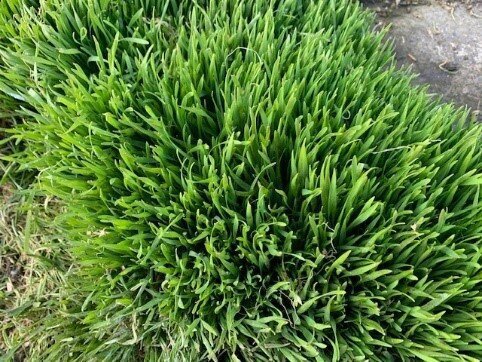Can you sprout or ferment our feeds?
That’s a question we are often asked.
The answer is yes, you can. The tricky thing is that we have so many kinds of seeds in the feeds and they all sprout at different rates. One type might sprout in four days, and another might not sprout for another week or even two weeks.
This vigorous spot of wheat grass sprouted from a small spill outside the week before. Nature at its best!
Wheat, peas and several other grains sprout very enthusiastically. Whenever we unload a truckload, the local wild birds enjoy the ones that spill, and since we are in Oregon, there is usually enough moisture to sprout them. We even had one little grain of wheat that was left in the office sink on Friday and on Monday greeted us as a six-inch-tall blade of wheatgrass, complete with roots! I should have taken a picture.
Below is a good article from the Mother Earth News Magazine.
Is Sprouting Grains and Seeds for Chickens Worthwhile?
By Amanda Sorell 2/9/2016 11:09:00 AM
Are sprouted grains and seeds a more nutritious feed for my poultry?
The best fare for your fowl includes age-appropriate feed and, if possible, the forage they’ll find by free-ranging or dining on pasture in a movable pen. Countless studies have confirmed that eggs from birds raised on pasture are richer in omega-3 fatty acids and vitamins A and E.
Seeking better poultry nutrition, some poultry enthusiasts are sprouting grains and seed for chickens, especially when green pasture is scarce. But the National Sustainable Agriculture Information Service (ATTRA) researched the potential benefits and concluded that sprouting does not significantly enhance the grains’ nutrient levels. A review published by Critical Reviews in Food Science and Nutrition agrees, pointing out that studies have failed to find a substantive nutrient gain when feeding birds sprouted rather than ungerminated grains. Washington State University’s Vegetable Research and Extension Program has published similar findings, saying, “Many farmers soak grain [for sprouting] prior to feeding it to livestock, particularly poultry. There is little science-based information regarding this practice.”
Chickens generally relish sprouts and offering them as a treat is fine (unless the sprouts have begun to mold). However, an article from the University of California explains why feeding sprouted grains (aka “hydroponic fodder”) on a larger scale isn’t cost-effective: “... seeds utilize the starch stored in the seeds during the first week or so of growth, before photosynthesis and root uptake of minerals kick in …”. This results in the sprouts containing 25 to 30 percent less dry matter compared with the whole grains. In most cases, this means that feeding sprouted grains would be considerably more expensive (and more labor-intensive) than feeding unsprouted grains.
Despite marketing claims that sprouted grains are a superior feed, University of Maryland extension specialist Susan Schoenian reports that, after many trials with many species in many countries, no consistent advantage has been proven. For a detailed discussion from the University of California, see Does Hydroponic Forage Production Make Sense? Learn more about feed options and find a map of organic poultry-feed suppliers at Organic Poultry Feed Suppliers Directory.

